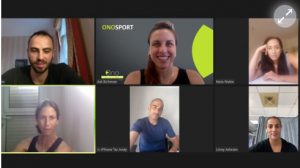 The corona virus has thrust the entire sports world into chaos. The Olympics have been postponed, competitions canceled, the skies closed and the future unclear.
The corona virus has thrust the entire sports world into chaos. The Olympics have been postponed, competitions canceled, the skies closed and the future unclear.
In the midst of all this chaos, the anxiety which many athletes face on thinking about the day after their career ends, has intensified. Many Israeli athletes have been pursuing a parallel track, and in addition to their regular training, they are developing their brain muscles as well, studying in the virtual classrooms of Ono Academic College in Kiryat Ono. YNET reports that Ono’s special program in sports and education brings together the best athletes in Israel. While in normal times, study takes place in classrooms in front of a blackboard (or whiteboard), today study takes place via squares on a screen in a zoom classroom.
Among those for whom the plague stopped their careers are rhythmic gymnast Linoy Ashram and Olympic swimmer Yaakov Tomarkin, who were at the peak of preparations for their big moment – the Olympic Games, but these were postponed for a year. During the remaining ten months until their next opportunity to compete, they will juggle between training / competitions and watching academic lectures on zoom. Distance learning makes it easier for them to combine training and study.
So what are they learning? The menu includes topics such as how to turn the practice of sports into a profession, how to manage a team or to be an entrepreneur in sports and to lead social change through sports. The academic program lasts three years, at the end of which they will receive a bachelor’s degree in education and society with a specialization in sports, combined with professional training certificates in instruction, coaching and sports management.
Tomarkin says: “The move stems from the thought of the day after [the end of my sports career]. I personally started business administration a few years ago, but I decided to change direction, because it seems to me that it is better for me to focus on studies that will help me in sports after I retire. Distance learning [is useful]. For example, I’ve been in competition in Hungary for five weeks now, and can connect with the class. It makes it easier for me. I’m in good company with some Olympic athletes.”
One of the leaders of the academic studies in sports and education is former swimmer Adi Bichman, who says: “This is an unconventional year, and it is going to be tough. There are guys who have already done half [of their studies] and do not know what it will be like later. On the other hand, distance learning allows athletes flexibility. They have a new world, when everything is recorded and you can enter the class whenever you want. One of our goals is to make sure that more and more professionals who come from this world enter the management track.”
Bichman refers to the difficulty athletes have finding themselves after retirement: “It is not easy to get out of competitive sports. It also took me many years until I realized what I want to do with myself. A professional athlete gets lost after retirement. There is a lot of passion in sports, but when you stop competing, it fades. And the athlete is looking for the same passion on a daily basis. I learned that life becomes different.”
Neta Rivkin, the first Israeli to win a medal at the World Championships in Rhythmic Gymnastics, describes the transition between the world of sports and the world of academics: “Studies will enrich the knowledge I have gained over the years. This is what sets me apart. Today I work as a mental competitor but I remember what it used to be like as a sportsperson. I used to be in a field that did not even allow me time to read a book and now I have plenty of time. The retirement process for an Olympic athlete is very difficult. Some manage to make a quick transition and become coaches right away, but for others the journey of self discovery is longer. Even for me, four years after retirement, I experimented working in several areas – and it was all trial and error.”
Dan Glazer, the star player of the champion Maccabi Tel Aviv football team is only at the beginning of his career, but he has long since begun to worry about his future, and is in the third year of his degree at Ono Academic College. “I also invested in my studies in high school. I was educated that success in football is not a guarantee of success in life,” says the mid-fielder.
“We are human beings, and obviously at 35 I will have to be ready for the next stage. The degree for me is a leap into the future, one that will allow me to continue engaging in sports on the day after. It will allow me to fulfill the dream of raising the next generation. I plan to set up a football school, invest and to give children the basics from an early age. “
The full article can be read at https://www.ynet.co.il/sport/article/r1fIjidww